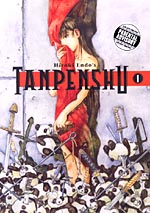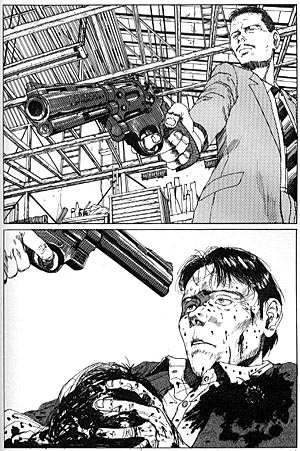 By Hiroki Endo
By Hiroki Endo
232 pages, black and white
Published by Dark Horse
It’s always interesting for a creator best known for one specific work to suddenly have something else published. Hiroki Endo’s main creation that’s been officially released in English is the epic Eden, a science-fiction dystopia set in the near future. Based on the book’s mix of thoughtfulness and extreme violence, the idea of getting a two-volume release of Endo’s other (primarily non science-fiction) stories is an appealing one indeed. And in the end? It’s a strange combination of everything and nothing that I expected.
 Tanpenshu opens with “The Crows, the Girl, and the Yazuka” and could best be described as a misfit girl adopting a targeted-for-death member of the gangster, with a race to see if the police or his fellow gangsters will find him first. At a glance it’s in many ways what you’d think; the wounded gangster learning from the young woman that’s taken him in even as the time that both have left ticks dangerously away. Even the girl tending for crows who were kicked out of their own flocks seems pretty standard, and you know just where this is going. Then she reveals that she’s missing one of her eyes because she gave it to the crows, and things begin to get strange. In many ways, that’s just what you get in all three stories of Tanpenshu Vol. 1; a story that starts normally and then takes a distinct turn into the realm of disturbing. “The Crows, the Girl, and the Yazuka” is probably my favorite of the three entries here, perhaps because the ending is absolutely logical in terms of what’s been set up so far, and yet it still feels startling in Endo’s hands. You’re shocked even as the story moves towards the conclusion, perhaps because you don’t want to see it happen, perhaps because you secretly do but don’t think that Endo will deliver on his promises. Either way, it works, a dark little fable about outcasts from peer groups that are supposed to help them, and what to truly care for and help someone else means.
Tanpenshu opens with “The Crows, the Girl, and the Yazuka” and could best be described as a misfit girl adopting a targeted-for-death member of the gangster, with a race to see if the police or his fellow gangsters will find him first. At a glance it’s in many ways what you’d think; the wounded gangster learning from the young woman that’s taken him in even as the time that both have left ticks dangerously away. Even the girl tending for crows who were kicked out of their own flocks seems pretty standard, and you know just where this is going. Then she reveals that she’s missing one of her eyes because she gave it to the crows, and things begin to get strange. In many ways, that’s just what you get in all three stories of Tanpenshu Vol. 1; a story that starts normally and then takes a distinct turn into the realm of disturbing. “The Crows, the Girl, and the Yazuka” is probably my favorite of the three entries here, perhaps because the ending is absolutely logical in terms of what’s been set up so far, and yet it still feels startling in Endo’s hands. You’re shocked even as the story moves towards the conclusion, perhaps because you don’t want to see it happen, perhaps because you secretly do but don’t think that Endo will deliver on his promises. Either way, it works, a dark little fable about outcasts from peer groups that are supposed to help them, and what to truly care for and help someone else means.
“Because You’re Definitely a Cute Girl” is easily the stronger of the other two stories; both it and “For Those of Us Who Don’t Believe In God” deal with students and how they view relationships and the world around them. “For Those of Us” is certainly good and gives a lot of characterization to a larger cast, the one you’ll remember is “Because You’re Definitely a Cute Girl” and Minako’s attempts to make sense of her life. It’s a story that at first seems rather ordinary, with a high school student trying to figure out boys even as she stresses over her home life and relationship with her father. As it begins to unfold, though, you begin to understand that something is not quite right. It’s to Endo’s credit that he’s able to sneak up on his reader, so to speak, writing a story about a girl’s mental downwards spiral and how it’s almost impossible to see until things are too late. Even when Minako’s mental condition has degenerated to the point of no return, Endo is still able make her sympathetic; she’s someone you should care about and pity, not hate.
Endo’s art in Tanpenshu was in some ways the only thing without any real surprise. It’s a strong, well-rounded style on display here, with characters all looking a little awkward and out of place, as if they aren’t comfortable in their own skin. Since that sums up most of the characters in Tanpenshu‘s stories, it’s a good fit. His characters are rarely attractive, with the majority of charm usually applied to the buildings and steel structures surrounding them. In an otherwise perfect world, they’re all out of place and stand out like sore thumbs. When the exception to the rule comes along, like Minako’s father’s new girlfriend in “Because You’re Definitely a Cute Girl” their good looks make them out of the ordinary instead of normal; it’s a neat trick and Endo uses it well to help provide the reader with the viewpoint of his characters and help you be firmly on their side.
Endo had already shown his skills as a creator thanks to Eden, but Tanpenshu shows his versatility to tackle other genres and ideas. If there’s still more Endo material untranslated out there, Tanpenshu shows that there’s definitely a need to have it read by as many people as possible. The fact that Tanpenshu is only two volumes long is a shame; until more Endo stories make their way into English, though, at least there’s still one more volume to look forward to. Perhaps not for the faint of heart, Tanpenshu is one of the books that make me happy that the flow of manga from Japanese to English continues unabated.
Purchase Links:
